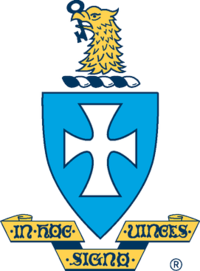Sigma Chi
| Sigma Chi | |
|---|---|
| ΣΧ | |
 |
|
| Founded | June 28, 1855 Miami University, Oxford, Ohio |
| Type | Social |
| Scope | United States and Canada |
| Motto | In Hoc Signo Vinces ("In This Sign You Shall Conquer") |
| Colors | Blue and Old Gold |
| Symbol | The White Cross |
| Flag |  |
| Flower | White Rose |
| Publication | The Magazine of Sigma Chi |
| Philanthropy | Children's Miracle Network and Huntsman Cancer Institute |
| Chapters | 242 undergraduate, 152 alumni |
| Members | 15,700+ collegiate 300,000+ lifetime |
| Nickname | Sigs |
| Headquarters |
1714 Hinman Avenue Evanston, Illinois United States |
| Homepage | web |
Sigma Chi (ΣΧ) is a social fraternity in North America. The fraternity has 244 active chapters across the United States and Canada and has initiated more than 300,000 members. The fraternity was founded on June 28, 1855 at Miami University in Oxford, Ohio by members who split from the Delta Kappa Epsilon fraternity.
Sigma Chi is divided into five operational entities: the Sigma Chi Fraternity, the Sigma Chi Foundation, the Risk Management Foundation, Constantine Capital Inc., and Blue and Gold Travel Services.
Like all fraternities, Sigma Chi has its own colors, insignia, and rituals. According to the fraternity's constitution, "the purpose of this fraternity shall be to cultivate and maintain the high ideals of friendship, justice, and learning upon which Sigma Chi was founded".
Sigma Chi was founded in 1855 by Benjamin Piatt Runkle, Thomas Cowan Bell, William Lewis Lockwood, Isaac M. Jordan, Daniel William Cooper, Franklin Howard Scobey, and James Parks Caldwell as the result of a disagreement over who would be elected Poet in the Erodelphian Literary Society of Miami University in Ohio.
Several members of Miami University's Delta Kappa Epsilon chapter (of which all but one of Sigma Chi's founders were members) were also members of the Erodelphian Literary Society. In the fall of 1854 the literary society was to elect its Poet and a member of Delta Kappa Epsilon was nominated for the position. He was supported by five of his brothers, but four others (James Caldwell, Isaac Jordan, Benjamin Runkle, and Franklin Scobey) supported another man who was not a member of the fraternity. Although Thomas Bell and Daniel Cooper were not members of Erodelphian they had aligned themselves with the four dissenting members. The chapter had twelve members total and were evenly divided on the issue. Both sides saw this as a matter of principle and over the next few months their friendships became distanced.
In February 1855 Runkle and his companions planned a dinner for their brothers in an attempt to seal the rift. Whitelaw Reid, one of the other brothers who supported the Delta Kappa Epsilon member as poet, was the only one to arrive. Reid brought a Delta Kappa Epsilon alumnus named Minor Millikin from a nearby town. Reid had told Millikin his side of the dispute and they had arrived to punish the group for not supporting their Delta Kappa Epsilon brother. The leaders of the rebellion, Runkle and Scobey, were to be expelled from the fraternity. The other four would be allowed to stay in the fraternity. Runkle resigned, and after the parent chapter at Yale University was contacted, all six men were formally expelled.
...
Wikipedia
